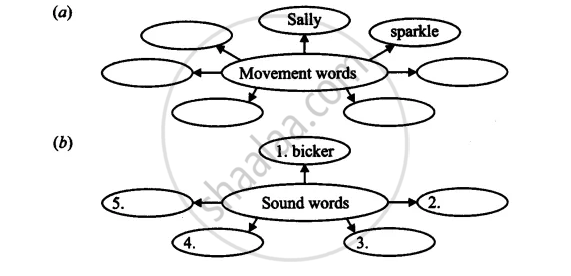Advertisements
Advertisements
Question
Read the lines in which the following phrases occur. Then discuss with your partner the meaning of each phrase in its context.
fuzzy head
Solution
Fuzzy head refers to the heads of the bright yellow flowers which have a beautiful texture.
APPEARS IN
RELATED QUESTIONS
Thinking about the Text
Given below are some emotions that Kezia felt. Match the emotions in Column A with
the items in Column B.
| A | B |
| 1. Fear or terror | (i) Father comes into her room to give her a goodbye kiss |
| 2. glad sense of relief | (ii) Noise of the carriage grows fainter |
| 3. a “funny” feeling, perhaps of understanding |
(iii) Father comes home |
| (iv) Speaking to father | |
| (v) Going to bed when alone at home | |
| (vi) Father comforts her and falls asleep | |
| (vii) Father stretched out on the safa. snoring |
“Toto was a pretty monkey.” In what sense is Toto pretty?
After reading the poem answer the following questions.
The poet has used a number of words which indicate 'movement' and 'sound'. Working
with your partner make a list of these words from the poem and complete the web chart.

(c.) A word or a combination of words, whose sound seems to resemble the sound it
denotes (for example: "hiss", "buzz", "etc.) is called onomatopoeia. From the words that
you have filled in the blurbs above point out these words.
Oh yes, we know it keeps them still,
They don't climb out the window sill,
They never fight or kick or punch,
They leave you free to cook the lunch
And wash the dishes in the sink....
But did you ever stop to think,
To wonder just exactly what
This does to your beloved tot?
IT ROTS THE SENSE IN THE HEAD!
IT KILLS IMAGINATION DEAD!
IT CLOGS AND CLUTTERS UP THE MIND!
IT MAKES A CHILD SO DULL AND BLIND
HE CAN NO LONGER UNDERSTAND
A FANTASY, A FAIRYLAND!
HIS BRAIN BECOMES AS SOFT AS CHEESE!
HIS POWERS OF THINKING RUST AND FREEZE!
HE CANNOT THINK - HE ONLY SEES!
Read the lines given above and answer the question given below.
Explain with reference to context.
Read the extract give below and answer the questions that follow:
All around the field spectators were gathered Cheeril!g on all the young women and men Then the final event of the day was approaching The last race about the beginning.
- Nine Gold Medals, David Roth
(i) Where had the 'young women and men' come from? What had brought them together? How had they prepared themselves for the event?
(ii) What was the last event of the day? How many athletes were participating in this event? What signal were they waiting for?
(iii) What happened to the youngest athlete halfway through the race? How did he respond?
(iv) What 'strange' tum did the story take at this point?
(v) Why does the poet say that the banner - 'Special Olympics' could not have been nearer the mark? What human quality does the poem celebrate?
Name some other creatures that live in anthills.
What was the king’s reaction when he came to know that he had lost the challenge?
Mention the year when the cricket rules were written for the first time
Who visited the shepherd one day, and why?
Why are dreams important? Mention two reasons.
Complete the following sentence
The chatter is electrical because ______
What kind of surprise could be found while walking on the grass?
What does the poet refer to ‘meadow houses’?
Make noun from the word given below by adding –ness, ity, ty or y
honest ___________.
What sort of life did Dogs live a long time ago?
Multiple Choice Question:
The child in this poem seems to be ____________.
What do you learn in the lesson about camels?
Read aloud the two paragraphs that describe the boy and the old man at the Lucky Shop.
What activities are dear to little children? Who does the child envy and why in the poem Vocation?
Read the following conversation.
Ravi: What are you doing?
Mridu: I’m reading a book.
Ravi: Who wrote it?
Mridu: Ruskin Bond.
Ravi: Where did you find it?
Mridu: In the library.
Notice that ‘what’, ‘who’, ‘where’, are question words. Questions that require information begin with question words. Some other question words are ‘when’, ‘why’, ‘where’, ‘which’ and ‘how’.
Remember that
- What asks about acting, things etc.
- Who asks about people.
- Which asks about people or things.
- Where asks about place.
- When asks about time.
- Why asks about reason or purpose.
- How asks about means, manner or degree.
- Whose asks about possessions.
Read the following paragraph and frame questions on the italicised phrases.
Anil is in school. I am in school too. Anil is sitting in the left row. He is reading a book. Anil’s friend is sitting in the second row. He is sharpening his pencil. The teacher is writing on the blackboard. Children are writing in their copybooks. Some children are looking out of the window.
